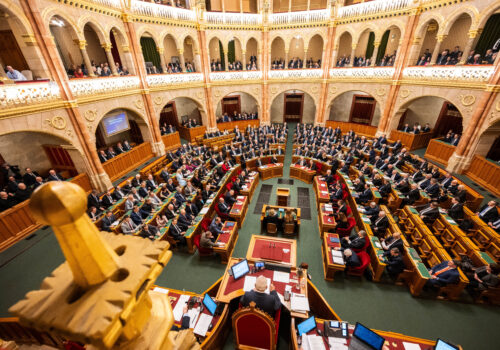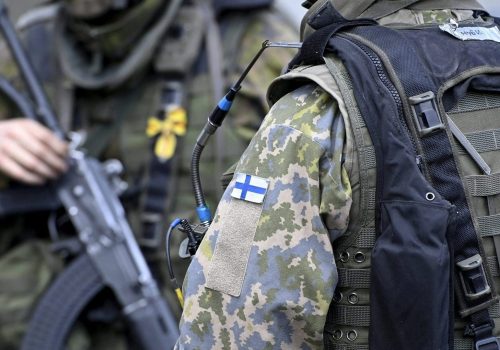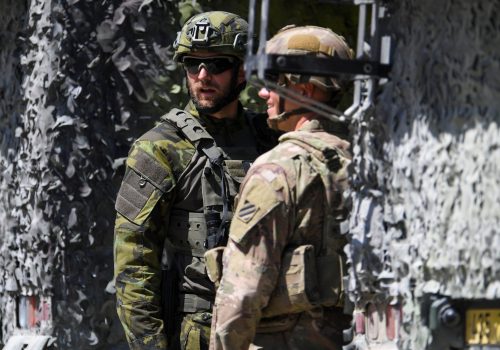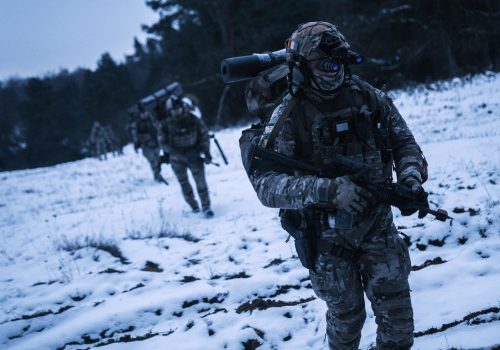When will Sweden and Finland join NATO? Tracking the ratification process across the Alliance.
This post was last updated on February 26, 2024.
And then there were thirty-two. Hungary has become the final ally to ratify Sweden’s entry into NATO, nearly two years after Sweden and Finland formally applied to join the Alliance in the wake of Russia’s full-scale invasion of Ukraine.
Follow Sweden and Finland’s journey with this tracker, in which the Atlantic Council team kept tabs on the rest of the allies as they ratified the amended NATO treaty to welcome two new members. And read on for more analysis of what will change now in NATO and what the world can learn from the lengthy ratification process.
Current count: Number of NATO members that have ratified NATO enlargement…
…for Sweden
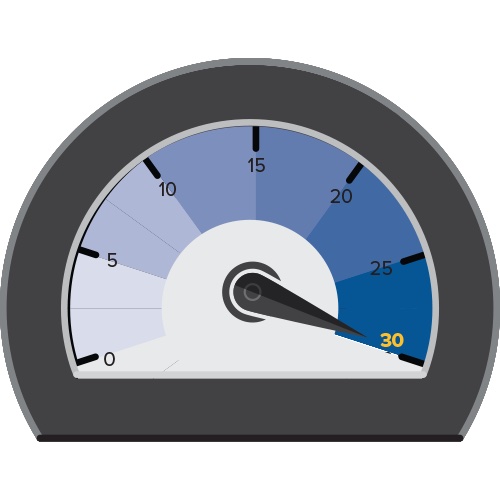
…for Finland

Timeline: NATO members that have approved Finland and Sweden’s accession, by date of ratification
Click the left and right arrows to move through the timeline
[cool-timeline category=”nato-finland-sweden” designs=”design-7″ order=”ASC” layout=”horizontal” show-posts=”40″]
Map: When each ally ratified Finnish and Swedish accession
Source: NATO Parliamentary Assembly
Cheat sheet: Expert intel on the final ratification debates
A day to celebrate NATO’s imperfect democratic decision-making
It has been a long-time coming, but Sweden has finally cleared the last hurdles to its NATO membership as the Turkish and Hungarian parliaments have ratified Sweden’s accession over the last few weeks. It is a shame it has taken this long—Sweden and Finland jointly applied for membership in May 2022—but the delay is a circumstance worth reflecting upon with some important insights into how NATO works.
In an alliance of thirty-two members, it is inevitable that allies will clash on certain issues. Bilateral disagreements between Stockholm and Ankara and Stockholm and Budapest contributed to the delay in getting Sweden’s membership across the line, showing the importance of constructive bilateral relations for keeping large institutions healthy. It may seem counterintuitive, but bilateral relations become more rather than less important once inside NATO, a point I have consistently made to Finnish and Swedish colleagues.
Of course, another aspect to the delay was the unseemly relationships between Turkish President Recep Tayyip Erdoğan and Orbán with Russian President Vladamir Putin. Putin’s disdain for NATO is well understood and that he could use his influence with NATO heads of state to delay Swedish membership is distressing. The delay also provided the Kremlin with the time and opportunity to undermine Sweden’s efforts to overcome Turkish and Hungarian objections through targeted disinformation campaigns.
Nevertheless, all the obstacles that Putin and others threw in the way of Sweden’s membership are now cleared, and NATO has grown again. Here is perhaps the most important lesson of all: Democratic institutions—like democracy itself—are messy. They require deliberation, debate, and horse-trading, which can be slow and painstaking. But when a decision is finally reached, it is likely to be more impactful for having worked through ahead of time any glitches that could undermine its effectiveness. Rather than wring my hands over the delay in Swedish membership, I choose to celebrate the fact of NATO’s imperfect democratic decision-making. A vengeful and determined Putin could slow but not ultimately undermine NATO’s intrinsic resilience—a fact that should be celebrated every bit as much as Sweden finally taking its formal seat at the NATO table.
—Christopher Skaluba leads the Transatlantic Security Initiative in the Atlantic Council’s Scowcroft Center for Strategy and Security.
Read what more Atlantic Council experts have to say about Sweden’s entry into NATO:
Further reading
Mon, Aug 22, 2022
Sweden and Finland are on their way to NATO membership. Here’s what needs to happen next.
Issue Brief By John R. Deni
In response to Russia's unprovoked invasion of Ukraine, Finland and Sweden took the historic step of applying to join NATO. Both nations will bring modern capabilities that will help defend against malign actors. As Finland and Sweden's membership is forthcoming, Alliance leaders, NATO watchers, and transatlantic security experts need to consider how to fully integrate the new allies, include them in operational plans, and best enhance defense of a longer border with Russia.
Fri, Jul 22, 2022
Now for the hard part: A guide to implementing NATO’s new Strategic Concept
New Atlanticist By Hans Binnendijk, Timo S. Koster
NATO should be proud of its recent accomplishments—but now it needs to follow through.
Tue, May 17, 2022
NATO Forward Forces Tracker
Trackers and Data Visualizations By
In the lead-up to and following Russia’s invasion of Ukraine in February 2022, the United States and NATO allies have taken numerous steps to bolster allied force posture in Eastern Europe. The Scowcroft Center for Strategy and Security’s Transatlantic Security Initiative has been tracking it all. Check out its interactive table and charts to visualize the changes over time.
Image: Sweden's Foreign Minister Ann Linde and Finland's Foreign Minister Pekka Haavisto attend a signing ceremony with NATO Secretary General Jens Stoltenberg, signing their countries' accession protocols at the alliance's headquarters in Brussels, Belgium July 5, 2022.
